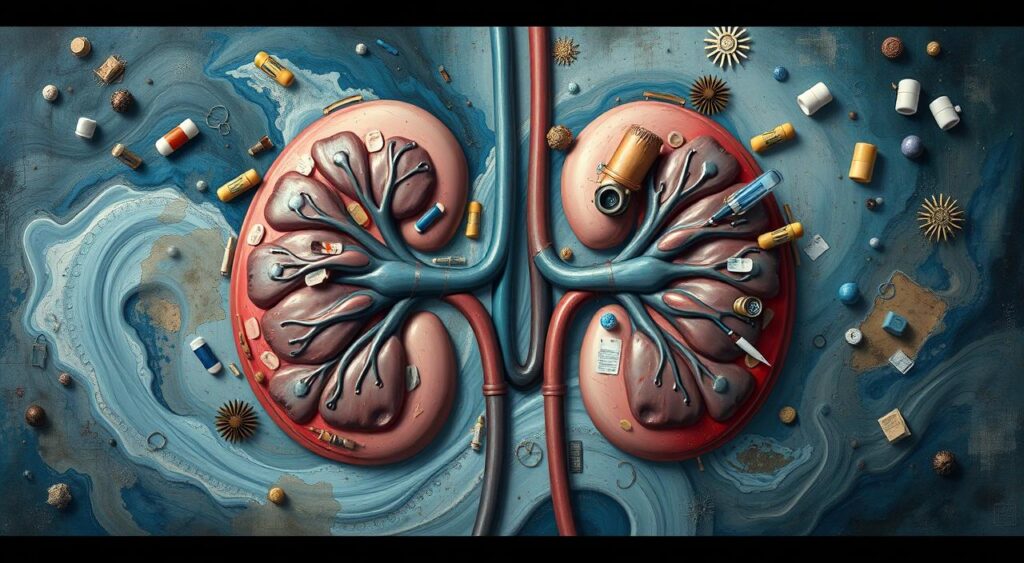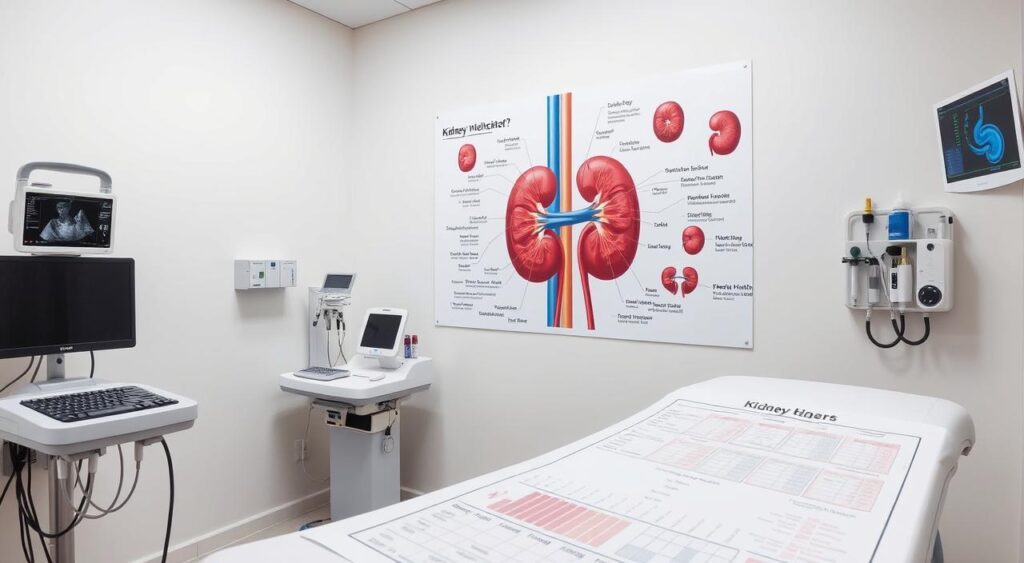Navigating chronic kidney failure – learn about symptoms, treatment options, and lifestyle adjustments to improve quality of life.
Many of them face chronic kidney failure, also known as renal failure. This happens when kidneys can’t filter waste and excess fluids from the blood. This leads to a buildup of toxins in the body.
Chronic kidney failure is a serious issue. It needs quick medical care and ongoing management to avoid more problems.
Chronic kidney failure, kidney disease, and renal failure all describe this condition. It can be caused by diabetes, high blood pressure, and family history. Knowing the causes, symptoms, and treatments is key for those affected.

Understanding chronic kidney failure is vital. Early detection, proper management, and lifestyle changes can slow its progress. In this guide, we’ll dive into the details of chronic kidney failure, kidney disease, and renal failure. We aim to give a full understanding of this condition.
Key Takeaways
- Chronic kidney failure, or renal failure, is a serious condition that affects millions of Americans.
- Kidney disease can progress to chronic kidney failure if left untreated or poorly managed.
- Understanding the causes, symptoms, and treatment options for chronic kidney failure is crucial for effective management.
- Lifestyle modifications, such as dietary changes, can help slow disease progression.
- Early detection and prompt medical attention are essential for preventing complications and improving outcomes.
- Chronic kidney failure requires ongoing management and monitoring to prevent further kidney damage.
Understanding Chronic Kidney Failure
Chronic kidney disease, or ckd, is when kidneys slowly lose their filtering power. This can cause severe symptoms if not treated. Knowing about chronic kidney failure helps manage the condition and avoid worse problems.
Kidney disease goes through stages, each with its own symptoms. Doctors use tests like the glomerular filtration rate (GFR) to measure kidney function. The earlier the stage, the milder the symptoms and the better the outlook.
What Is Chronic Kidney Disease?
Chronic kidney disease is a long-term issue. It can be caused by diabetes, high blood pressure, and family history. Recognizing signs like changes in urine, fatigue, and leg swelling is key.
How Kidneys Function
Kidneys are vital for health, filtering waste and excess fluids. They also control electrolytes, produce hormones, and keep acid-base balance. When kidneys fail, it can cause serious problems.
Stages of Kidney Disease
Kidney disease has five stages, from mild damage to end-stage renal disease. Here’s a quick overview:
| Stage | Description | GFR Level |
|---|---|---|
| 1 | Mild kidney damage | 90% or above |
| 2 | Mild loss of kidney function | 60-89% |
| 3 | Moderate loss of kidney function | 30-59% |
| 4 | Severe loss of kidney function | 15-29% |
| 5 | End-stage renal disease | Below 15% |
Common Causes and Risk Factors
Chronic kidney failure is a complex condition with many causes and risk factors. Knowing these factors is key for kidney failure diagnosis and prevention. Common causes include diabetes, hypertension, and genetic disorders.
Other medical conditions, like kidney stones and urinary tract infections, can also increase the risk. Certain medications and a poor diet can play a role too. Lack of exercise is another factor.
Here are some common causes and risk factors for chronic kidney failure:
- Diabetes
- Hypertension
- Genetic disorders
- Family history of kidney disease
- Certain medications
It’s important to recognize these causes and risk factors for kidney failure diagnosis and treatment. By understanding the causes of kidney disease, people can prevent or manage it. This reduces the risk of complications and improves health.
Recognizing the Signs of Chronic Kidney Failure
Early detection is key in managing chronic kidney failure. Spotting the signs of kidney failure can lead to quick medical help. This can greatly improve treatment chances. Knowing the early and advanced symptoms is crucial for kidney health.
Early signs include fatigue, swelling in the legs and feet, and changes in urination patterns. As it gets worse, symptoms like nausea and vomiting, muscle cramps, and chest pain may appear. If you notice these, get medical help right away.
When to seek medical attention:
- Severe swelling in the legs, feet, or face
- Difficulty breathing or chest pain
- Sudden changes in urination patterns or blood in the urine
- Severe fatigue or weakness
Recognizing kidney failure signs and getting medical help quickly is vital. It can lead to better treatment and quality of life. Working closely with doctors is essential to manage symptoms and create a treatment plan.
| Symptom | Description |
|---|---|
| Fatigue | Feeling tired or weak |
| Swelling | Swelling in the legs, feet, or face |
| Changes in urination | Changes in frequency, color, or consistency of urine |
Diagnosis and Medical Evaluation
Getting a kidney failure diagnosis can change your life. It’s important to know how it’s diagnosed. The process includes tests to see how much damage your kidneys have and why.
The steps to diagnose chronic kidney failure are:
- Blood tests to check for waste products like creatinine and urea
- Urine tests to look for protein and blood
- Imaging tests, like ultrasound or CT scans, to see the kidneys
- Kidney biopsies to check the tissue and damage level
These tests help doctors know how bad the chronic kidney failure is. They then plan the best treatment. Getting the diagnosis right is key to stopping more damage and helping treatment work better.

For people with chronic kidney failure, a detailed medical check-up is vital. It lets doctors keep track of the disease and change treatment plans as needed. Knowing about the diagnosis and tests helps you manage your condition better and stay healthier.
| Test | Purpose |
|---|---|
| Blood tests | Evaluate waste products in the blood |
| Urine tests | Assess protein and blood in the urine |
| Imaging tests | Visualize the kidneys and detect abnormalities |
| Kidney biopsies | Examine kidney tissue and determine the extent of damage |
Treatment Options for Chronic Kidney Failure
For those with chronic kidney failure, treatment for kidney failure is key. It helps manage the condition and slow its progress. The main aim is to fix the underlying causes of kidney damage and stop it from getting worse. When it reaches end-stage renal disease, treatment gets more complex and may require big lifestyle changes.
Treatment for chronic kidney failure includes medicines, lifestyle changes, and medical procedures. Here are some of the options:
- Medications to manage symptoms and slow disease progression
- Dialysis options, including hemodialysis and peritoneal dialysis, to filter waste products from the blood
- Kidney transplantation, which involves surgically implanting a healthy kidney from a donor
Along with these treatments, people with chronic kidney failure need to make big lifestyle changes. This might mean eating a special diet, exercising often, and keeping an eye on blood pressure and sugar levels. By teaming up with their healthcare team and making smart choices, they can manage their condition well. This improves their quality of life.
Dietary Modifications and Nutrition
For those with chronic kidney disease (ckd), changing what they eat is key. A good diet can help slow down kidney damage. It’s important for people with renal failure to choose their foods wisely to keep their kidneys healthy.
Nutrition is crucial for managing kidney disease. A renal dietitian can craft a diet plan that fits an individual’s needs. This plan might suggest foods that are nutrient-rich but gentle on the kidneys.
Recommended Foods
- Leafy green vegetables like spinach and kale
- Fresh fruits like berries and citrus fruits
- Whole grains like brown rice and quinoa
- Lean protein sources like chicken and fish
Foods to Avoid
- Foods high in sodium and phosphorus
- Processed meats and foods high in saturated fats
- Sugary drinks and foods high in added sugars
Getting help from a renal dietitian is vital. They can guide people with kidney disease in making better food choices. By adjusting their diet, individuals can manage their condition better and improve their health.

Living with Kidney Disease: Daily Management
Living with kidney disease means making changes, but it’s possible to live fully. A key part is sticking to your medication plan. This can slow down chronic kidney failure.
It’s also important to live a healthy lifestyle. This includes eating right, drinking lots of water, exercising, and handling stress well. Here are some tips for managing kidney disease:
- Follow a renal diet to reduce the strain on the kidneys
- Stay hydrated by drinking plenty of water
- Exercise regularly to maintain overall health
- Manage stress through techniques such as meditation or deep breathing
Regular health check-ups and keeping an eye on kidney function are key. By working with your doctor and making lifestyle changes, you can manage chronic kidney failure well. This improves your life quality.
Support Systems and Resources
For those facing kidney failure symptoms, a strong support system is key. Managing kidney failure treatment can feel overwhelming. That’s why it’s crucial to look into available resources.
There are many resources out there, like support groups, financial aid, and help for caregivers. These can offer emotional support, help with costs, and practical tips for daily life with kidney disease.
Support Groups
Support groups are a big help for those with kidney disease. They offer a safe place to share, ask questions, and connect with others facing similar issues.
Financial Assistance
There’s financial help available for treatment costs. This includes government programs, non-profit groups, and private companies offering aid. Some examples are:
- Medicare and Medicaid
- Non-profit organizations that help with kidney disease treatment costs
- Private companies with financial assistance programs
Caregiver Resources
Caregivers are crucial for those with kidney disease. Resources for caregivers, like support groups and online forums, offer emotional support and practical advice.
By using these support systems and resources, people with kidney disease can manage their condition better. Remember, treating kidney failure needs a full approach. This includes medical care, emotional support, and financial help.
| Resource | Description |
|---|---|
| Support Groups | Safe space to share experiences and connect with others |
| Financial Assistance | Help with treatment costs through government programs and non-profit organizations |
| Caregiver Resources | Emotional support and practical advice for caregivers |
Conclusion: Taking Control of Your Kidney Health
Managing chronic kidney failure requires you to be proactive. You are the leader of your care team. Knowing the stages of kidney disease and spotting early signs can help you protect your kidneys.
The path ahead may be tough, but there are many treatment options. These include medicines, diet changes, dialysis, and transplants. Work with your doctors to create a plan that fits your needs.
You don’t have to face this alone. Look for support from groups and dietitians who know about renal failure. With the right help and attitude, you can manage your kidney health and enjoy life.
FAQ
Q: What is chronic kidney failure?
A: Chronic kidney failure, also known as end-stage renal disease (ESRD), is a serious condition. The kidneys lose their ability to filter waste and excess fluid. This leads to harmful substances in the blood and may require dialysis or a transplant.
Q: What are the common causes of chronic kidney failure?
A: Diabetes and high blood pressure are the main causes. They damage the kidneys’ blood vessels and filters over time. Other causes include glomerulonephritis, polycystic kidney disease, and genetic disorders.
Q: What are the early warning signs of chronic kidney failure?
A: Early signs include fatigue, frequent urination, and swelling in the legs. Difficulty concentrating and loss of appetite are also signs. As it worsens, symptoms like nausea, vomiting, and confusion may appear.
Q: How is chronic kidney failure diagnosed?
A: It’s diagnosed with blood tests, urine tests, and imaging scans. A blood test measures the glomerular filtration rate (GFR). A urine test checks for protein or other substances that indicate kidney damage.
Q: What are the treatment options for chronic kidney failure?
A: Treatments include medications, dialysis, and kidney transplantation. The plan depends on the disease stage and health. Medications manage symptoms, dialysis replaces filtering, and transplantation offers a new kidney.
Q: How can diet and nutrition help manage chronic kidney failure?
A: Diet is key in managing kidney disease. Eat fruits, vegetables, whole grains, and lean proteins. Avoid foods high in sodium, potassium, and phosphorus. A renal dietitian can help with a personalized meal plan.
Q: What support systems are available for individuals with chronic kidney failure?
A: Support systems include support groups, financial help, and caregiver resources. Support groups offer emotional support and shared experiences. Financial programs help with treatment costs. Caregiver resources provide guidance and support.
